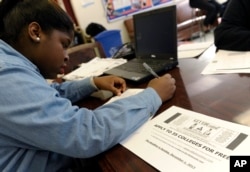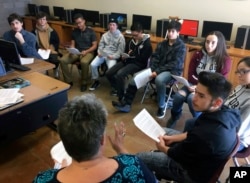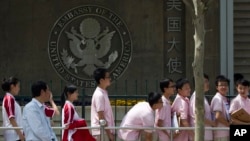Student Union
- By Pete Musto
Recommendation Letters Can Help Boost Your College Chances

When it comes to reaching one’s goals, there is a saying English speakers often use to explain the path to success. It goes like this:
“It’s not what you know, but who you know...”
Those words suggest that being hard working or knowledgeable is not the only way to get what you want in life. Very often it can even be more important to have a relationship with someone who can help you reach your goals.
Kenley Jones says that in a way, the same could be said of the process of applying to colleges and universities in the United States.
Jones is the director of international admissions at the University of Redlands, a private, liberal arts and science university in southern California. He says most U.S. colleges and universities often base their admissions decisions on an applicant’s test results and school work. But he admits that this information does not always do the best job of explaining the strengths of each applicant.
There are other parts of a college application that do more to describe personal qualities, says Jones.
For example, most U.S. colleges and universities ask applicants to list their activities outside the classroom. Also, many require applicants to provide a brief written statement that describes the kind of people they are.
But Jones notes that many students list activities which some admissions officials may know very little or nothing about. Some students may feel listing specific details of these activities is unimportant because they do not directly relate to their field of study, he says. And some students may be unwilling or unable to share this information about themselves in writing.
“There’s many cultures out there where students taking upon themselves to stand out…about certain…things that they’re involved in, socially, would be considered sort of a negative thing,” Jones told VOA. “So sometimes it’s very hard to get students, depending on the culture or situation, to expound on some of the things they’re doing…And it takes, sometimes an active voice from someone else to…bring that to life and to our attention as well.”
Jones argues that not every student has to be the strongest writer. That is especially true if students are applying to a program in which writing is not a major part of their duties. But in that case, they will need a recommendation from someone who is skilled in writing a letter in support of the applicant.
Most U.S. colleges and universities require applicants to provide at least one letter of recommendation, Jones says. However, these statements should not be from just anyone who knows the applicant. After all, he notes, admissions officials expect most applicant’s friends and family to be extremely supportive of the student.
Schools want to hear from people who will speak honestly and objectively about an applicant, says Jones. Admissions officials want to hear what an individual outside the applicant’s immediate circle of contacts thinks of that person. And they want to hear examples of the better qualities the student has demonstrated over the years.
Jones adds that, depending on who offers it, a letter of recommendation can bring attention to a quality a student might not think about. For example, an employer might be able to describe leadership qualities that an applicant may not know he or she is demonstrating.
However, recommendations do not always have to say how great an applicant is, he adds. The person writing the recommendation can explain to admissions officials how a student overcame a serious mistake. The writer could, for example, say how he or she witnessed the applicant getting caught doing something dishonest in school. But then the writer could say how the applicant learned the seriousness of the offense and demonstrated a change in behavior.
“A letter of recommendation can add a little bit of context,” Jones said. “It can add a little bit of strength. It can clarify some things and really push the decision, typically, in favor of the student.”
That is why asking the right people to write a letter of recommendation is important, says Jones. Some colleges and universities have rules about exactly who should write such letters. Admissions officers often want the writer to be a teacher the applicant studied under, often teachers of specific subjects. Jones says applicants should choose someone they have studied under recently.
If a school lets applicants name whomever they want to write a recommendation, he says, there are often plenty of people who would be a good choice. This includes religious leaders, leaders of sports teams, volunteer and social group organizers, work supervisors and co-workers. Almost anyone an applicant feels they have a strong relationship with would be a good person to ask.
Some applicants might feel unsure about who in their lives they might have this kind of connection with, Jones notes. In that case, the applicant should ask teachers, friends and family members who they think might be able to provide a strong recommendation.
But he also says just because an applicant wants a recommendation from a specific person does not mean that person will know how to write one.
“You want somebody who feels comfortable writing on your behalf,” he said. “And I think that’s a good question to ask someone that you want to write on your behalf. Are they comfortable with writing a letter of recommendation for you? And even if they are comfortable I think there are some things students can do to get the most out of that recommendation.”
Jones notes that applicants have no control over what people will write about them. Most schools will not let applicants read a letter of recommendation before the writer sends it. But applicants can discuss the things they think are important about themselves and make suggestions before the letter is written. And applicants should ask for letters of recommendation well before the final date that schools will accept them. That way the writer has plenty of time to consider everything they want to say in support of the applicant.
See all News Updates of the Day
- By VOA News
International students discuss US campus culture shock

International students at De Anza College in Cupertino, California, talked about culture shock in an article in La Voz News, the student newspaper.
"It felt like a major culture shock. Everything was so different, from academics to mannerism," said a student from Mexico.
Read the full story here.
These are the most expensive schools in the US
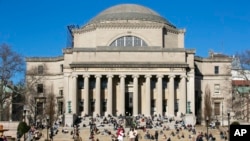
High tuition costs along with housing and food expenses can add up for students at U.S. colleges and universities.
MSNBC looked at the most expensive schools in the country, with one costing more than $500,000 for a bachelor’s degree. (June 2024)
Uzbekistan students admitted into top US universities

Students from Uzbekistan are among the international students admitted to top colleges and universities in recent years.
Gazata.uz profiled some of the Uzbekistan students attending Harvard, Brown, Princeton and other U.S. universities. (June 2024)
- By Stella Hsu
Reports of visa checks, deportations worry Chinese STEM students in US
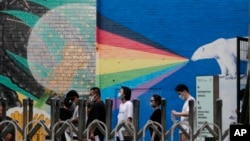
Geopolitical tensions and growing competition in tech between the United States and China appear to be spilling over into academia despite commitments from the world’s two biggest economies to boost people-to-people exchanges.
The United States remains the top choice for Chinese students seeking to study abroad with nearly 300,000 studying in American colleges and universities during the 2022-2023 school year. But reports of some cases that students and professors are facing extra scrutiny while passing through immigration and the deportation of others are raising concerns.
For Chen Xiaojin, a doctoral student studying semiconductor materials at a university in the Washington, D.C., metropolitan area, it has been six years since she returned to her hometown of Beijing.
At first, it was the COVID-19 pandemic that kept her from going home. But over the past two years, she has been deterred by accounts of Chinese students majoring in science and engineering being required to reapply for their visas upon returning to China.
She also says she is worried by reports over the past six months of Chinese students being deported, even at nearby Dulles Airport.
"My current research is relatively sensitive, and my boss [adviser] is getting funds from the U.S. Department of Defense, making it even more sensitive,” she told VOA. "I am afraid that I won't be able to return after I go back [to China]."
Chen says that if she did return to China, she would have to apply for a new visa.
In a report late last month, Bloomberg said it had found at least 20 Chinese students and scholars with valid visas who were deported at U.S. Customs since November and barred from reentry. The U.S. Customs and Border Protection Agency does not release relevant data.
Immigration attorney Dan Berger represented one Chinese student who was deported late last year. He tells VOA Mandarin that the student studied biological sciences at Yale University and was about to complete her doctorate.
She visited her family in China and got a new visa but was deported by customs at Dulles Airport and barred from reentering the country for five years. Berger said he did not see anything suspicious in the transcript of the conversation between the student and the customs officer.
"We have seen what seems like a pattern over the last six months of Chinese PhD students being turned around…. more than I've seen in quite a while," he said.
Matthew Brazil, a fellow at the Jamestown Foundation, said neither country seems willing to explain the situation. However, he believes that in most cases, the United States must have valid reasons for blocking visa holders from entering the country.
In some cases, the student’s background may not match what is written on the visa application. In other cases, customs agents may also find something that the State Department missed, and once they see it, they are responsible for taking action.
"I wish the Chinese side would be specific about their students who were refused entry,” he said. “The fact that both sides are mum on details and that the Chinese side is engaged with the usual angry rhetoric means that each has security concerns. And that says to me that there was good reason for the U.S. to stop these particular applicants."
Brazil also sees a connection between the entry denials and export control regulations issued by the United States in October 2022 that restrict China's ability to obtain advanced computing chips, develop and maintain supercomputers, and manufacture advanced semiconductors.
U.S. Customs and Border Protection is one of the law enforcement agencies authorized to investigate violations of export control regulations, he said.
"Beijing's intelligence agencies are known to focus attention on PRC [People's Republic of China] students and scientists headed abroad who study or work on dual-use technologies controlled under the Export Administration Act — compelling Chinese students and scientists to report on what they've learned when they return to China on holiday,” he said. “This has been true for decades."
Bill Drexel, a fellow for the Technology and National Security Program at the Center for a New American Security, said the U.S. government did find some cases where students tried to steal strategic technology for China.
"I think it would both not be surprising that they found some really questionable or incriminating evidence for some students,” he said. “It would also not be surprising if, in their hunt for really solid evidence, they also may have made some mistakes on other students.”
Drexel adds that “it’s just kind of an unfortunate fact of the time that we live in and the tactics that the CCP uses when it comes to these measures."
In a post on X in early May, U.S. ambassador to China Nicholas Burns tried to dispel concerns about visas and entry to the United States for students and scholars. In the post, he said "99.9% of Chinese students holding visas encounter no issues upon entering the United States.”
In an interview with The Wall Street Journal Monday, Burns said it is China that is making it impossible to promote people-to-people ties. Burns told the Journal that students attending events sponsored by the United States in China have been interrogated and intimidated.
He also said that since U.S. President Joe Biden and China’s leader Xi Jinping held their summit in San Francisco last year, China’s Ministry of State Security and other agencies had interfered with Chinese citizens’ participation at some 61 events.
At a regular briefing on Wednesday, Chinese Foreign Ministry spokesperson Mao Ning dismissed those accusations, saying that they did not “reflect reality" and that went against key understandings reached by both countries’ presidents in San Francisco.
“The United States, under the pretext of 'national security,' unjustifiably harasses, interrogates, and deports Chinese students in the U.S., causing them significant harm and creating a severe chilling effect,” Mao said. “The image of the United States in the minds of the Chinese people fundamentally depends on the actions of the United States itself.”
Drexel said he believes Burns’ comments about visas and students' willingness to study in the U.S. still ring true.
“On balance, it's still the case that American universities are overwhelmingly warm towards Chinese students and want them in large numbers," he said.
However, Berger, the immigration lawyer, is concerned about the chilling effect recent cases involving Chinese students could have.
"In general, we are being more careful about advising Chinese graduate students in STEM fields about traveling and letting them know that there is some small risk,” he said.
Even though the risk is small, it does seem to be real at the moment, he said.
Adrianna Zhang contributed to this report.
US federal judge blocks new regulation targeting for-profit colleges
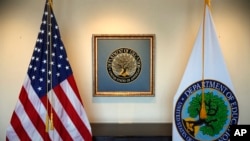
A federal judge in Texas has blocked a regulatory provision targeting for-profit colleges that was scheduled to take effect in July 2024.
Times Higher Education reports that the rule, which would affect student loans, was challenged by for-profit institutions. (June 2024)




